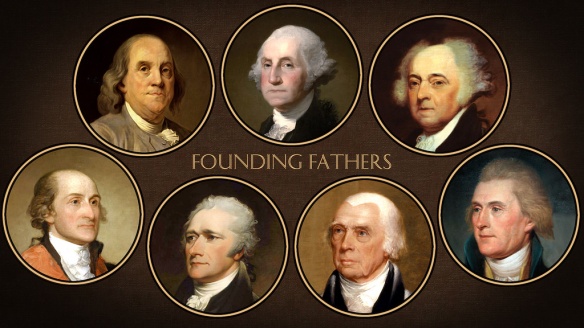They were lawyers, farmers, merchants, writers and physicians. Those are some of the professions of our Founding Fathers, a topic I wrote about in “Professions of Our Founding Fathers.” Some were wealthy. Some lost everything during the Revolutionary War.
Thomas Jefferson left behind a mountain of debt when he died on July 4, 1826, the 50th anniversary of the signing of the Declaration of Independence, which he primarily wrote. His rival John Adams, who died just hours later that same day, died free of debt and the owner of 275 acres of land.
No matter their financial situations, these men were successful in creating a new country, one with the largest economy in the world. At $18 trillion, the economy of the United States is close to one-quarter of the economy of the entire world.
As we approach the 241th celebration of that fateful day in Philadelphia, when 13 colonies started the process to create our country, here are some quotes from our Founding Fathers that can inspire any business owner or CEO along with some of their beliefs I find to be self-evident.
 They believed in hard work and persistence.
They believed in hard work and persistence.
“I’m a great believer in luck, and I find the harder I work, the more I have of it.” – Thomas Jefferson
“Diligence is the mother of good luck.” – Benjamin Franklin
“Perseverance and spirit have done wonders in all ages.” – George Washington
“Energy and persistence conquer all things.” – Benjamin Franklin
“A people…who are possessed of the spirit of commerce, who see and who will pursue their advantages may achieve almost anything.” – George Washington
“By failing to prepare, you are preparing to fail.” – Benjamin Franklin
“Applause waits on success.” – Benjamin Franklin
They believed in keeping their minds sharp and continually learning.
“Old minds are like old horses; you must exercise them if you wish to keep them in working order. – John Adams
“An investment in knowledge pays the best interest.” – Benjamin Franklin
“Tell me and I forget, teach me and I may remember, involve me and I learn.” – Benjamin Franklin
They believed in the power of principles, confidence and reputation.
“It takes many good deeds to build a good reputation, and only one bad one to lose it.” – Benjamin Franklin
“Associate with men of good quality if you esteem your own reputation; it is better to be alone than in bad company.” – George Washington
“The circulation of confidence is better than the circulation of money.” –– James Madison
“Those who stand for nothing fall for anything.” – Alexander Hamilton
“One man with courage is a majority.” – Thomas Jefferson
“In matters of style, swim with the current; in matters of principle, stand like a rock.” – Thomas Jefferson
“Tis more noble to forgive than to revenge an injury.” – Benjamin Franklin
They recognized that we the people are only human and it’s important to forgive.
“A fondness for power is implanted, in most men, and it is natural to abuse it, when acquired.” – Alexander Hamilton
“I never expect to see a perfect work from imperfect man.” – Alexander Hamilton
I’ll close with one of my favorite quotes from Thomas Jefferson, as I make a living as a consultant and turnaround authority. It’s always good to seek help on matters where you need it.
“He who knows best knows how little he knows.”

